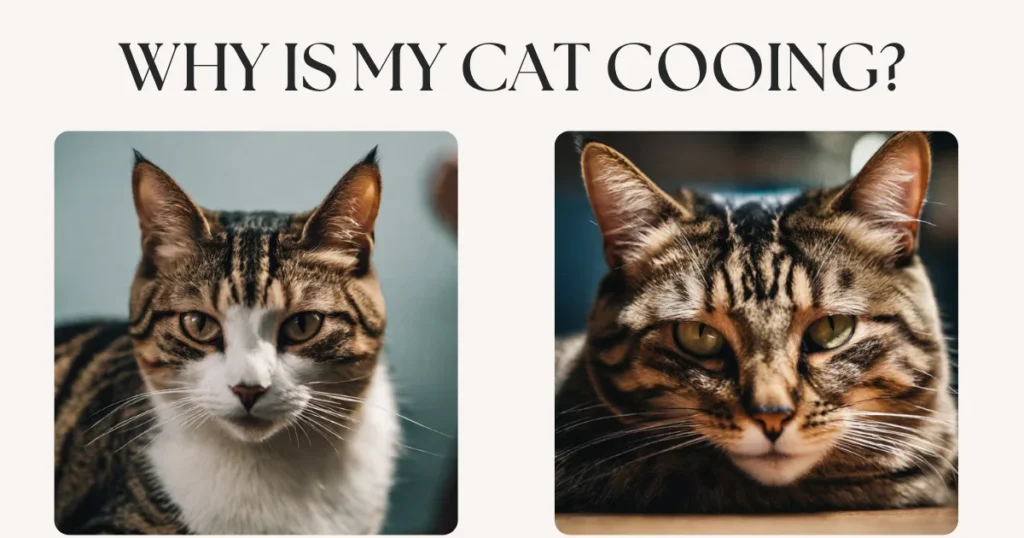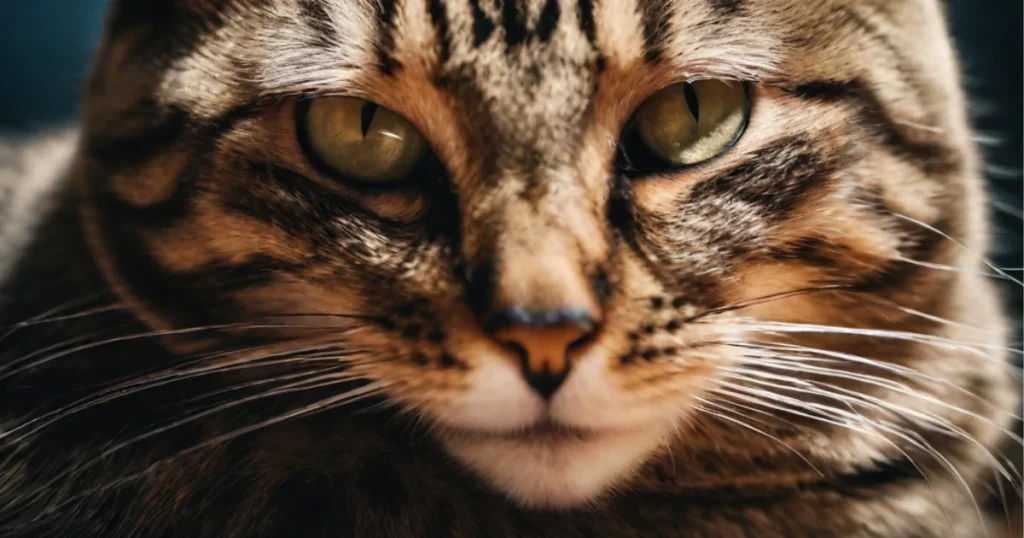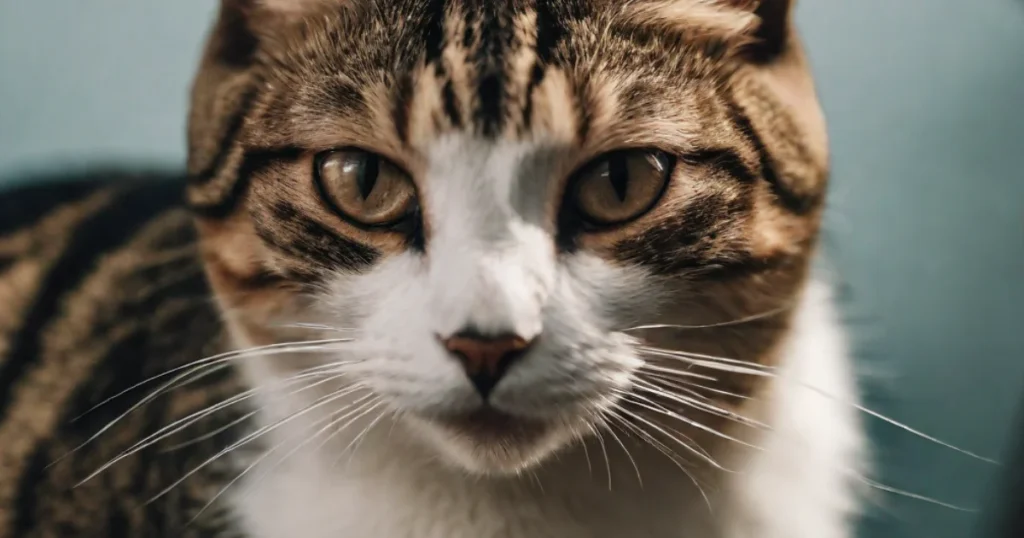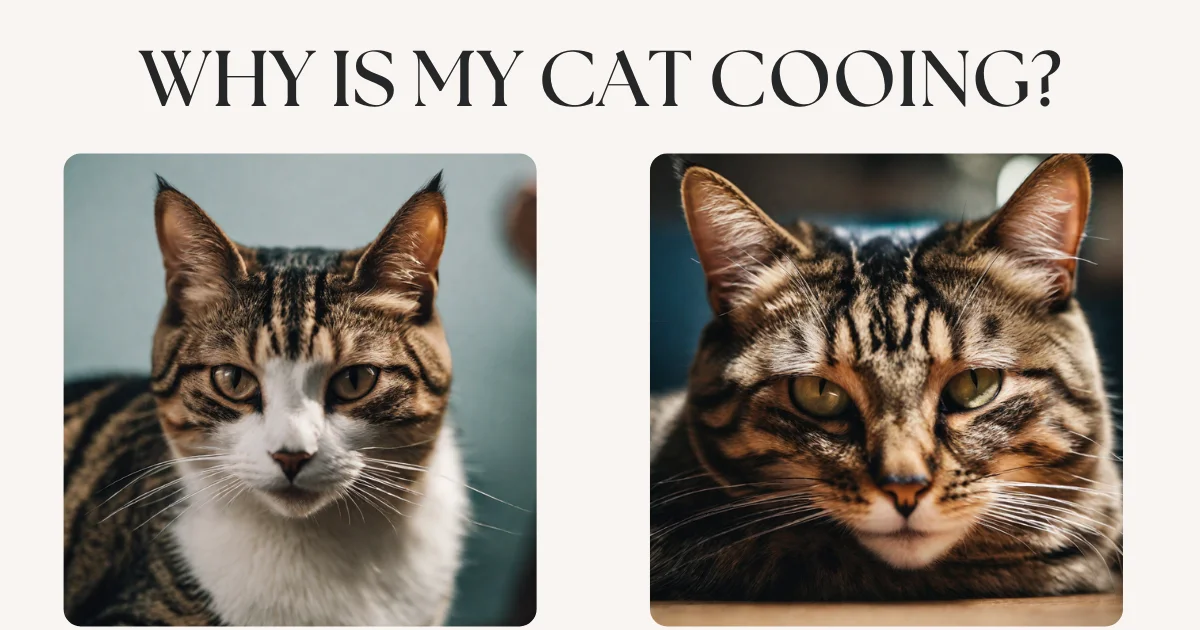Have you ever heard your cat making a soft, cooing sound and wondered what it meant? While we are used to hearing our feline friends meow, purr, and hiss, the sound of cooing may come as a surprise. But fear not, this is a completely normal behavior in cats. In fact, cooing is just one of the many ways cats communicate with us and other animals. If you’re curious about why is my cat cooing, then keep reading to learn more about this unique vocalization and what it means for your furry companion.
Why Is My Cat Cooing?
At times, cats emit unique chirpy and cooing sounds that resemble those of birds. This vocalization, known as trilling, differs from regular meowing in both its tone and purpose. Trilling serves as a high-pitched, bird-like noise that cats use to greet humans or other feline companions, conveying a sense of warmth and friendliness.
Table of Contents

Understanding the Basics of Feline Communication
Cats are mysterious creatures, and their communication can sometimes leave us puzzled. However, by delving into the basics of feline communication, we can begin to decipher their messages. Cats use a combination of vocalizations, body language, and scent marking to convey their feelings and intentions.
One common way cats communicate is through vocalizations. We are all familiar with the meow, which can mean anything from a simple greeting to a request for food or attention. But cats also communicate through a variety of other sounds, including purrs, hisses, and yes, coos. Each vocalization carries its meaning and can be a way for cats to express different emotions.
Body language is another important aspect of feline communication. A cat’s posture, tail position, ear position, and facial expressions can all provide clues about their mood and intentions. For example, a cat with an upright tail and relaxed ears is likely to feel content, while a cat with a lowered tail and flattened ears may be feeling threatened or defensive.
Scent marking is another form of communication used by cats. They have scent glands in various parts of their body, such as their paws and cheeks, and they use these glands to mark their territory and communicate with other cats. By rubbing against objects or leaving urine markings, cats can establish their presence and communicate with other felines.
Understanding the basics of feline communication can help us better understand our cats’ behaviors and needs. By paying attention to their vocalizations, body language, and scent marking, we can develop a deeper bond with our feline companions and ensure their well-being.
Decoding Your Cat’s Cooing Sound: Why Is My Cat Cooing?
Cats are known for their diverse range of vocalizations, but what exactly does it mean when your feline friend starts cooing? Cooing is a soft, melodic sound that cats make, often resembling the cooing of a dove. It is usually associated with contentment, relaxation, and a sense of security. When your cat coos, it is their way of expressing happiness and comfort.
Cooing is commonly heard when a cat is in a relaxed state, such as when they are cuddled up on your lap or basking in the sun. It can also occur during grooming sessions or when they are playing with their favorite toy. Essentially, cooing is a sign that your cat is feeling safe, content, and at ease in their environment.
It’s important to note that not all cats coo, and some may have different vocalizations to express their contentment. Every cat is unique and may communicate specially. Pay attention to your cat’s body language and overall behavior to better understand what their cooing means to them.
So, the next time you hear your cat cooing, you can rest assured knowing that they are happy and comfortable in their surroundings. Enjoy the peaceful melody and cherish the special bond you share with your feline companion.

The Factors Influencing Your Cat’s Cooing Behavior
The factors that influence your cat’s cooing behavior can vary from cat to cat. Some cats may be more inclined to coo due to their breed, personality, or previous experiences. For example, certain breeds, like the Siamese or the Burmese, are known to be more vocal and may be more likely to coo. Additionally, if your cat has been socialized from a young age and has had positive experiences with humans, they may be more prone to cooing as a way of expressing their contentment.
Another factor that can influence your cat’s cooing behavior is their overall comfort level in their environment. Cats are more likely to coo when they feel safe, secure, and relaxed. If your cat has a cozy, comfortable space to call their own, they may be more likely to coo. Conversely, if they are feeling stressed or anxious, they may be less inclined to make cooing sounds.
The relationship between you and your cat can also play a role in their cooing behavior. Cats that have a strong bond with their owners are more likely to coo as a way of expressing their happiness and comfort in your presence. If you provide your cat with love, attention, and plenty of affectionate interactions, they may be more inclined to coo as a form of communication.
Overall, the factors influencing your cat’s cooing behavior can be unique to each cat. By observing your cat’s behavior, taking note of their breed and personality traits, and providing a safe and comfortable environment, you can help encourage cooing and foster a stronger bond with your feline companion.
When Should You Be Concerned About Your Cat’s Cooing?
Cooing is a normal behavior in cats and is typically associated with contentment and relaxation. However, there may be instances when your cat’s cooing raises concerns. While it’s important to remember that every cat is unique and may have their quirks, there are a few situations in which you should pay closer attention to your cat’s cooing.
One possible concern is a sudden change in your cat’s cooing behavior. If your cat has always been a cooer and suddenly stops making those sounds, it could indicate a change in their overall well-being or comfort level. Conversely, if your cat has never cooed before and suddenly starts doing so excessively, it could be a sign of an underlying issue.
Another reason for concern is if your cat’s cooing is accompanied by other unusual behaviors or symptoms. For example, if your cat is cooing excessively while displaying signs of distress, such as pacing, hiding, or avoiding contact, it may be an indication of anxiety or stress. Additionally, if your cat’s cooing is accompanied by changes in appetite, weight loss, or lethargy, it could be a sign of an underlying health issue.
If you notice any concerning changes in your cat’s cooing behavior or if you have any doubts about their overall well-being, it’s always a good idea to consult with a veterinarian. They can help assess your cat’s condition and provide guidance on any necessary steps to ensure your cat’s health and happiness. Remember, it’s always better to be safe than sorry when it comes to your furry companion.

Consulting a Vet: Understanding When It’s Necessary
As a responsible and caring cat owner, it’s important to be vigilant about your furry companion’s health and well-being. While cooing is typically a normal behavior in cats, there may be instances when you should consider consulting a veterinarian.
One situation that warrants a trip to the vet is if your cat’s cooing is accompanied by other concerning symptoms. For example, if your cat is cooing excessively and also showing signs of distress, such as increased aggression, loss of appetite, or difficulty breathing, it could indicate an underlying medical issue. A veterinarian can conduct a thorough examination and provide the necessary treatment or intervention.
Additionally, if you notice a sudden change in your cat’s cooing behavior or if they have never cooed before and suddenly start doing so excessively, it’s a good idea to seek professional advice. This could be an indication of a behavioral or health issue that requires further evaluation.
Remember, a veterinarian is the best person to assess your cat’s condition and provide guidance. Trust your instincts and reach out to a professional if you have any concerns about your cat’s cooing or overall well-being. Your furry friend deserves the best care possible, and a veterinarian can help ensure they stay happy and healthy.
Conclusion
As you’ve learned throughout this blog post, cooing is a completely normal behavior in cats. It is just one of the many ways they communicate with us and other animals. Understanding the basics of feline communication, such as vocalizations, body language, and scent marking, can help us better understand our furry friends and strengthen our bond with them.
When it comes to cooing, it is typically a sign of contentment, relaxation, and a sense of security in their environment. It’s a soft, melodic sound that expresses their happiness and comfort. However, every cat is unique, and some may communicate their contentment in different ways. By paying attention to your cat’s body language and behavior, you can decipher what cooing means to them.
While cooing is generally nothing to worry about, there may be instances when you should be concerned. Sudden changes in cooing behavior, excessive cooing accompanied by distress or other unusual symptoms, or if your cat has never cooed before and suddenly starts doing so excessively, are all signs that warrant a trip to the veterinarian. Your cat’s health and well-being should always be a top priority.
Overall, cooing is a delightful and peaceful sound that brings joy to both cats and their owners. Cherish these special moments of communication and enjoy the unique bond you share with your feline companion.
FAQs
Q: Why does my cat make a cooing sound?
A: Cats often make cooing sounds as a way of expressing contentment, affection, or a friendly greeting. It’s a unique vocalization that some cats use to communicate with their owners or other cats in a positive and welcoming manner.
Q: Why is my cat making a low humming noise?
A: A low humming noise made by a cat can indicate various things. It may be a sign of relaxation, contentment, or even an expression of pleasure, similar to a cat’s purring. Some cats also hum when they are in the presence of something they find enjoyable or comforting.
Q: Why is my cat cooing at night?
A: Cats may coo at night for different reasons. It could be their way of seeking attention, expressing loneliness, or trying to initiate playtime. Some cats are naturally more active during nighttime, and their cooing may be a way of engaging with their surroundings or signaling their desire for interaction.
Q: Why does my cat sound like a baby?
A: Cats can produce sounds that resemble a baby’s cry or mewling. This behavior is known as “infantile vocalization” and is often seen in cats who are seeking attention, demanding food, or expressing distress. Some cats retain this behavior into adulthood as a way of communicating their needs or garnering attention from their owners.

